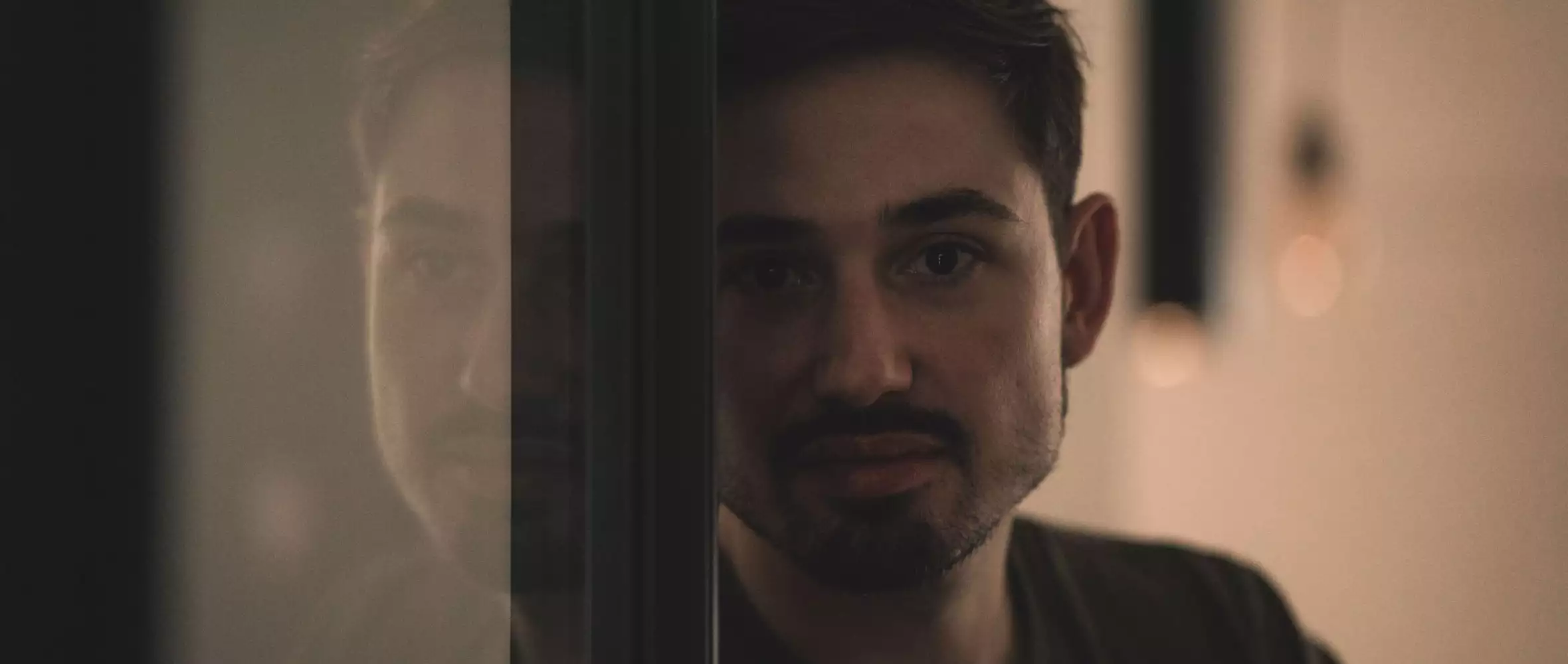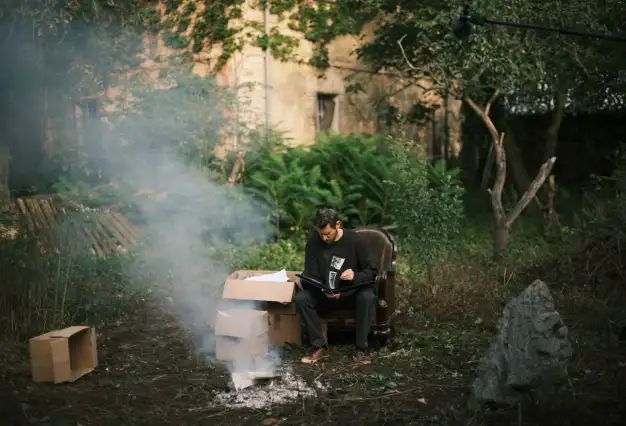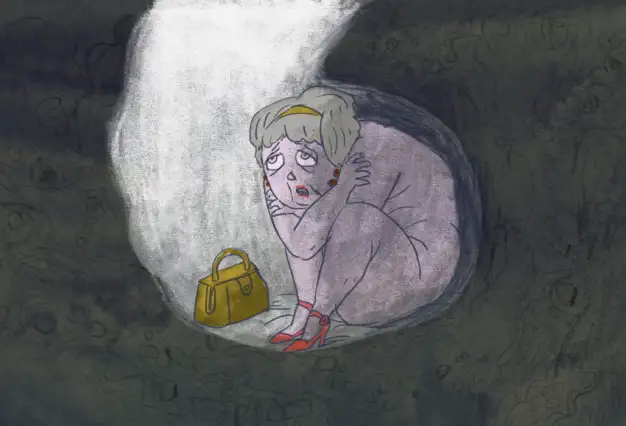
11 January 2024
I like to start with a clean slate
I like to start with a clean slate

Slovak composer and musician Jonatán Pastirčák, aka Pjoni (b. 1993), was nominated for two Czech Lions in 2023, for his scores on Arved and Nightsiren, taking home the prize for the former. He also composed the score for the film adaptation of Jáchym Topol’s prize-winning novel A Sensitive Person, which competed in the Karlovy Vary IFF that same year. The hard-working composer has also been involved in a host of other projects of various genres appearing at leading festivals, including the miniseries Suspicion, the sci-fi drama Ordinary Failures, and the documentary The Visitors.
by Vojtěch Rynda for CZECH FILM / Spring 2024
You first got involved with music as part of a children’s choir, and also played cello. You then went on to study at the School of Audio Engineering (SAE) in London. What did these two institutions mean to you?
What I learned from my childhood was that working with acoustic instruments is extremely important to me. Even though I’m mostly into electronic music, I use acoustic instruments a lot, especially the cello, which I record myself. I draw on their sound and know various methods of using them unconventionally. For instance, I like to explore extremes, like bowing the strings under the bridge; this is what’s known as extended technique. SAE is an institute that exists in different cities around the world, including a branch in London. Probably the most important thing I got from there was learning how to work in a recording studio and getting experience in production.
When composing for film, what do you usually start from, what’s your starting point?
The script. Once I have that, I can discuss the project with the filmmakers. I like to come up with basic themes well in advance, so they already have something to work with in the editing room. I try to approach each project with an open mind, not having any concept of what the score should sound like. I want to feel the film as much as possible in advance, and then start creating by trying to play. I’ll take a scene and try just one sound, one tone, and search for the primary feeling of that scene, then start from there.
Do you talk to the filmmakers on set? Do you go into the editing room?
I rarely make it to set, but I like to visit to feel the atmosphere and the spirit of the work. By meeting the creators, I can feel their intent and I can reflect that in my music from the beginning. If the project has been in the editing process for six months or more, I get numerous versions, which can differ greatly. I try to respond to them, though it’s tedious to redo the music for each new version. Instead I prepare themes to work with in the editing room, and then when the cut is almost final, I edit the score to match.
Would you say you’re a fan of scores that serve a film, that don’t try to dominate and draw unnecessary attention to themselves?
It depends. In Tereza Nvotová’s Nightsiren, for example, there’s a passage filmed in the spirit of magical realism that takes place in a forest with naked, phosphorescent creatures. It’s based on music and it wouldn’t work without it; it was conceived that way from the get-go. But unless you want the music to dominate, you don’t want to have it duplicate other components. If there’s a heartbreaking scene, there shouldn’t be sad music to go with it, since that ends up weakening the emotion. Raw, naked emotions tend to be stronger than those embellished with music. Instead of replicating the mood of the action, the film score should complement the narrative, so the final feeling is created by the combination of the individual components.
How did the work on Arved and Nightsiren differ?
The music I did with Aid Kid for Arved was more conceptual, since we were involved in the creative process from the start. A lot of the creative work happens in your head just by thinking about the project for a long time, and with Arved I had more of that mental space. I read the script early on in development and was able to discuss it with the director, Vojtěch Mašek. On Nightsiren I shared the nomination [for a Czech Lion] with ROB [Robin Coudert], my French colleague, but it wasn’t really a collaboration. ROB had to leave the project due to time constraints, and I continued the work on my own after that. It was my third collaboration with Tereza Nvotová, and I feel like we quickly found the right language for the music, in between horror and magical, even dreamlike.
What made your work on A Sensitive Person, which competed at the Karlovy Vary IFF in the summer of 2023, special for you?
It was very special. The director, Tomáš Klein, has the admirable courage to leave his comfort zone, and he tried to instill that courage in everyone who worked on the film. It was a challenging journey, but one that in retrospect I’m grateful for. It took us a while to find the right musical approach. We wanted the score to work with the same raw and unpolished energy as the other expressive components. We were inspired by [Jim] Jarmusch’s Dead Man, for example. Even though I had the script well in advance, we experimented with the score until almost the last minute before the final export. In the end, I had no idea whether the score worked or if it was any good. It probably wasn’t an ideal process, but it was definitely an inspiring and important experience.
How did you create the soundtrack for the documentary You Will Never See It All, about the painter Ján Mančuška, which premiered at the Jihlava IDFF?
Although it tells the story of Ján Mančuška, the film has a great relevance and universal value, and approaches the genre of biographical documentary with sensitivity and originality. It’s about the emptiness of absence, but also about a certain peace that comes with it, about the passing of time, Ján’s discipline and his almost obsession with creation. I tried to bring all this into the music. For example, part of the soundtrack is composed of the sounds of various small objects Ján used in his work—medicine boxes, pins, matches. These seemingly insignificant objects served as material for him to build a new world. It was one of my favorite collaborations—I really enjoyed creating the soundtrack.
You have a reputation for being an incredibly hard worker. What else have you accomplished in 2023?
I spent a good part of the year on unofficial paternity leave. But I did manage to almost finish an album together with Slovak singer Erika Rein—the first single was released in early December—and an EP with Milan André Boronell, a Canadian-Slovak singer-songwriter. My own solo album, unfortunately, is still on hold. But I also composed music for the documentaries Olympic Halftime and Borders of Europe, and for Peter Bebjak’s miniseries Mathematics of Crime.
At the moment, I’m finalizing music for a documentary on the director of the Slovak National Gallery, Alexandra Kusá, who, in spite of all the obstacles, managed to complete the huge project of reconstructing the Slovak National Gallery. The music for Marie-Magdalena Kochová’s documentary The Other One is in progress; preparations for Tereza Nvotová’s new film, Father, are beginning. Together with Michal Novinski, I’m also working on music for the film Havnaa, by the Norwegian director Bård Breien. I’m just glad to be working on such meaningful, interesting projects.
Related news
Related people
Pjoni
Music




